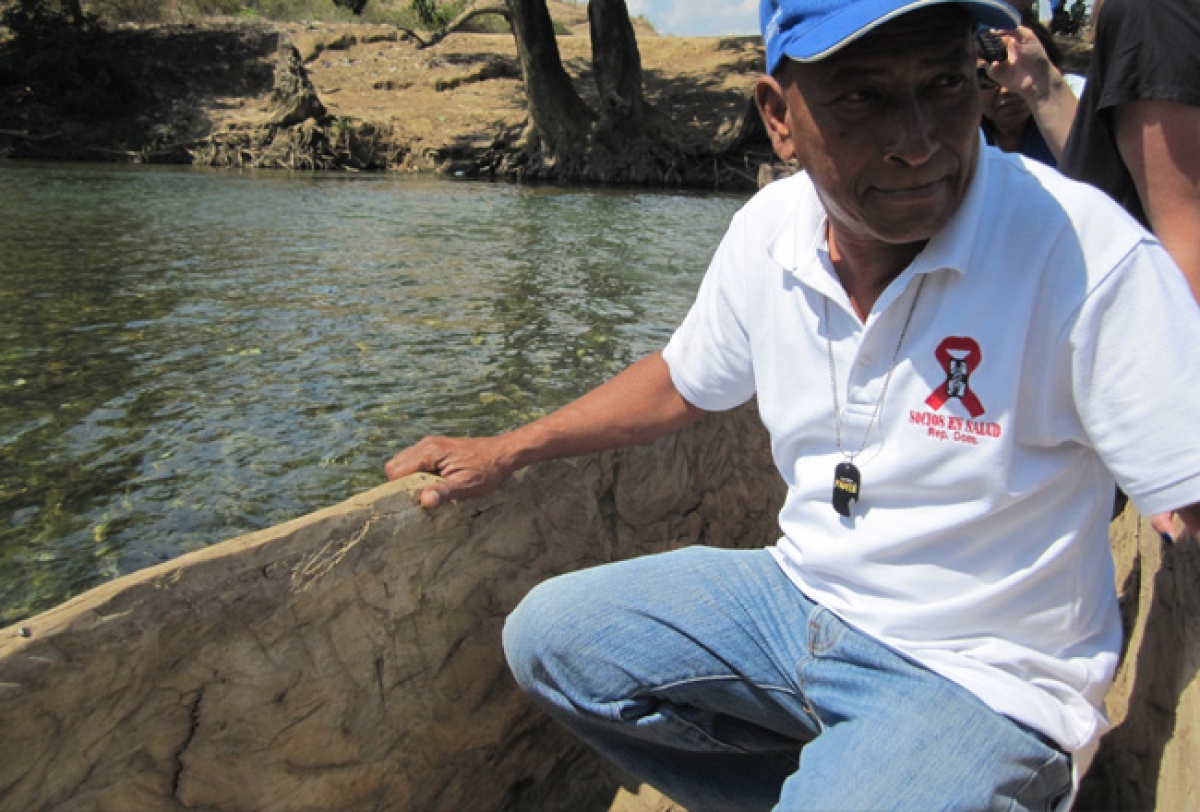Crossing Rivers—and Cultural Bounds—in the Dominican Republic
Posted on May 23, 2013

Nelson Moreta climbs into a canoe carved out of a tree trunk, a makeshift ferry to carry him across the Artibonite, the wide, shallow river that divides the island of Hispaniola into the Dominican Republic and Haiti.
We’re on the far western side of the Dominican Republic in Elias Piña, the country’s poorest province. Except for a lone guard who waves people by without concern for passports, the river is the only sign of a border. The melody of konpa, the popular music of Haiti, drifts across the water and into the DR, one of many migrants to breach the porous border.
Moreta, a 53-year-old Dominican, spent 17 years working as a promoter of Barceló rum. But in 2011, he began working for Socios En Salud (SES), Partners In Health’s Dominican sister organization. Today he’s crossing the river to visit two Haitian HIV patients who live in Haiti, just across the border from the Dominican hospital in Banica. As a community health worker, his mandate is to provide social support and accompaniment to patients, no matter the obstacles.
“There are too many people with needs, too many people who are sick and don’t know it,” he explains.
Started in 2011 with funding from the U.S. Agency for International Development, Socios En Salud works to bolster HIV services at three existing Dominican Ministry of Health facilities. SES staffers conduct HIV education and testing in communities, provide training and supplies to local clinicians, and offer psychosocial support to patients through social workers and community health workers, such as Moreta.
While the SES-supported facilities are within the DR, a large percentage of their patients are Haitians who move to the DR for work—often without papers. While the economic opportunities are better in the DR, Haitians face new challenges, including discrimination and isolation, Moreta says.
“I defend the Haitians 100 percent no matter where they are,” he says. “They’re our brothers, and they live in bad conditions. They need a helping hand.”

Moreta passes through a nearby market on his walk from the river to his patient's homes. Photo: Stephanie Garry/Partners In Health.
After a half-hour walk under the blistering Caribbean sun, we arrive at the house of Francisco Ubiele, 50, where he lives with his family. It’s a small wooden home with eroding concrete floors, a tin roof, and curtains for bedroom doors. Also at the house is Mason Alcilie, 48, another man with HIV who lives nearby and has come to share his story.
After a few minutes, Ubiele and Alcilie open up about their experiences. Late last year, they fell sick. At first, they thought it was some kind of fever, and they tried to wait it out. By the time they went to the hospital in Banica, about an hour and a half closer than the nearest PIH clinic in Haiti, they were nearly unconscious.
Ubiele’s family carried him to the facility on a mattress. A friend of Alcilie’s hauled him on the back of a motorcycle to the river crossing. From there, friends had to carry an alarmingly gaunt Alcilie from the canoe to the shore because he could hardly stand.

Mason Alcilie, now 48, was gaunt and nearly unconscious when a friend brought him to a PIH-supported clinic last year. Photo: Benigno Antonio Nuñez Faña/Partners In Health.
At the hospital, the men tested positive for HIV and were immediately enrolled in the SES program, and shortly after began antiretroviral therapy. After spending more than a week in the facility, they returned home and were linked with a community health worker who would meet them at the river to give them their medicine, vitamins, and food packages. But now Moreta goes a step further by visiting them several times a week to make sure each patient is taking his medicine as directed and doing well.
Unlike many of SES’s patients who are HIV positive, Ubiele and Alcilie aren’t worried about others in the community knowing they have the virus. “I was sick, and now I feel good. It doesn’t matter if people know,” Alcilie says.
We thanked the patients and stepped outside the house, back into the brilliant light of midday, and began our trek back toward the river.

Nelson with Alcilie (left) and Francisco Ubiele (right). The health of both patients improved markedly after starting daily treatments. Photo: Stephanie Garry/Partners In Health.
Moreta reflected on the achievements of SES, explaining that one of the major victories has been community outreach and testing for HIV. Before SES began its work, the hospitals in Elias Piña offered HIV testing and care, but few sought out these services. Now, SES conducts multiple community outreach activities each month. Since the start of the project, the number of active patients enrolled on antiretroviral therapy has more than doubled from 22 to 70.
As much as Moreta believes in helping Haitians on principle, he also knows that it’s in his country’s best interests to fight HIV. He pauses, and points out that Ubiele fell ill after visiting his wife, who lives in La Romana, a large city more than 200 miles east of Elias Piña. She doesn’t know that her husband is sick, and she likely doesn’t know her HIV status, Moreta says.
PIH/SES staffers like Nelson offer a hopeful sign that Dominicans can—as they did after the 2010 earthquake in Haiti—see that their fates are inextricably entwined with their western neighbor.
A former journalist, Stephanie Garry works on the communications team at Partners In Health. She was a Peace Corps Volunteer in the Dominican Republic from 2009-2011

